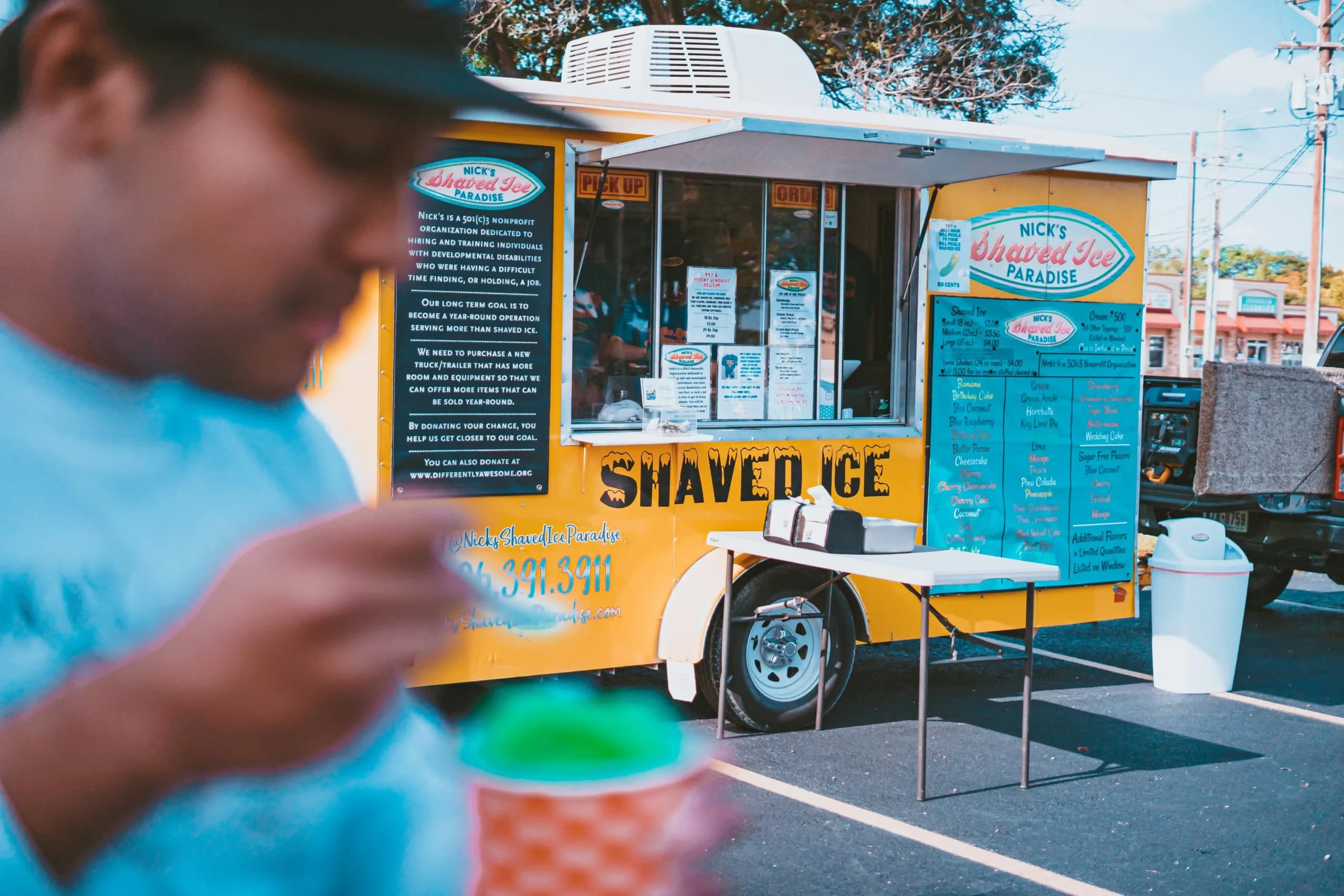Set your business up for success by getting all the necessary food truck licenses in Arizona. Each city and county has unique regulations, so you must check with your local government to make sure you don’t miss anything. Take note of the application and renewal fees as you consider food truck profitability to get accurate financial projections.
1. Arizona Transaction Privilege Tax (TPT) license
A TPT license isn’t a typical business license. It’s a special license you need from the Arizona Department of Revenue (ADOR) whenever you sell food, whether you run a food truck or a small café. The ADOR also collects the state, county, and city taxes under one system.
It’s basically a tax on the privilege of doing business in the state, so it’s required to operate legally. Serving food in AZ without a TPT license can lead to a fine or even a misdemeanor charge. Even if you only do one event, like a fair or festival, you still need this type of food permit.
To get your TPT license, you must fill out the Arizona Joint Tax Application (Form JT‑1). It covers TPT, withholding tax, and unemployment insurance. You can apply online via the Arizona Business One Stop portal (B1S) or download the form and mail it in, or bring the completed form to an ADOR office in Phoenix, Mesa, or Tucson.
Online filings usually give you the license number right away, and the physical certificate arrives in about a week. Paper and in-person filings also go fast, but not quite as fast.
You’ll need your Federal EIN or your Social Security number (if you’re a solo owner). If you’re a single‑member LLC, you must have an EIN.
The TPT license costs just $12 one-time, whether you only serve at one event or run a full-blown operation. If you serve in multiple cities, you’ll need a TPT license for each one, unless you consolidate licensing through the same EIN.
Take note that tax reporting depends on how much you owe. For those earning less than $2,000 per year, you only need to file annual returns. It’s quarterly for those earning between $2,000 and $8,000, while those over $8,000 must file monthly.
Late filings incur a 4.5% penalty per month, up to 25%. And there’s a 50% penalty if ADOR suspects fraud.
2. County health permits and facility requirements
A county health permit is another core operational license you need in Arizona to legally prep and serve food. Without it, your business, whether a food truck or catering unit, can’t operate. The permit comes from your local health department, and it’s a must-have in any county you work in.
A valid health permit shows that your vehicle or unit meets state and local sanitation requirements. This includes keeping washwater separate from using approved cleaning materials.
Before you can even apply for a permit, you must lock in a commissary agreement. That’s an arrangement with a licensed kitchen (the food truck commissary) where you’ll clean, store inventory, and dump waste. Every state rule requires it, even if you only serve at events a few times a year. Without that, you can’t move forward.
For example, in Maricopa County or the Phoenix area, you’ll need the mobile food establishment permit. You choose between Type I (full prep on-site), which costs $120 per year, or Type III (prepackaged only), which costs up to $610 per year.
Submit your application, commissary agreement, menu, route sheet, and photos to the Maricopa County Environmental Services Department. They’ll review, then mail your permit and permit plate for posting on your unit.
In Pima County or the Tucson area, you’ll need the Annual 1700A permit with fees from $236 to $416, depending on how risky your menu is. Think of risky in terms of whether you’re handling raw meat or just serving prepackaged snacks, especially when you’re considering unique and fun food truck ideas.
The plan review fee is $230, which is required before you apply for the health permit. Similar to Maricopa, you’ll need to submit your commissary agreement, as well as layouts, plumbing schematic, and menu.
3. City business license or mobile food vendor license
City-level permits matter just as much as state or county ones. Even with a state TPT license and county health permit, you can’t operate legally in any city without its own business or vendor license. It’s separate from the state TPT license or health permits.
Every city has unique rules and requirements. A license in Phoenix won’t apply in Tucson or Mesa, even next door. These licenses ensure you follow local regulations, zoning laws, and safety rules. They’re essential for staying compliant and saving you from costly downtime or fines.
City licensing departments, like the City Clerk in Phoenix, Business Services in Tucson, or Licensing in Mesa, handle these permits. You’ll apply directly to them for this type of license.
In Phoenix, you’ll need a mobile vending license. The application fee is $350 plus $30 per year for the permit itself. You must file in person at Phoenix City Hall.
Next door in Mesa, you must show your county health permit, fire inspection proof, and insurance when applying. The application fee is $10 plus $25 for the background check and $100 for the license fee.
Going south to Tucson, you’ll need a business license issued by city hall plus a vendor permit, which costs $181.50 per year. If you’re joining events, you may need a special event permit, typically $100 to $200 per month.
Each city has its own process and fees. Some may require business licenses, others mobile vendor permits. Always check the local municipal website before planning your route.
Keep in mind that zoning, hours, and location rules vary by city. Check for restrictions on proximity to schools, brick-and-mortar restaurants, or residential areas.
Some places also mandate that your food truck must leave private property after hours. For example, Tucson peddler hours are from 6 a.m. to 11 p.m., so be sure to check your specific location’s nighttime parking and storage regulations.
4. Fire inspection certificate or fire operational permit
If your food truck uses cooking equipment, like propane burners, grills, or fryers, you need a formal fire inspection certificate or fire operational permit from your local city’s fire department. This way, you confirm that your truck meets all fire safety standards. This includes equipment checks and ventilation systems designed to prevent accidents.
Your local fire department, like Phoenix Fire, Tucson Fire, or Mesa Fire, is in charge of this permit. These teams inspect your setup and make sure it’s safe before signing off.
Propane tanks must be secure and leak-tested. Your truck must also have type I hood systems for grease vapors and must be tested every 6 months. You must also have fire extinguishers onboard, both Class K for grease fires and 2‑A:10‑BC for electrical and general fires. Lastly, you’re required to install carbon monoxide and propane leak detectors.
Thanks to HB 2094, a valid fire inspection certificate from one city is accepted by another for up to 12 months. That means you don’t have to pay for and schedule duplicate inspections if you move from Tucson to Mesa, for example.
Fire inspection fees are usually around $150, but this can climb depending on your setup and city requirements. Expect additional charges if you have complex equipment or multiple cooking appliances.
5. Food handler card or employee health permit
In Arizona, every staff member who prepares or serves food must hold a food handler card (also known as an employee health permit). It proves your staff understands the basics of food safety, things like proper hygiene, cross-contamination, and safe temperatures.
The Arizona Department of Health Services (ADHS) sets the standards and approves training providers, like ServSafe or StateFoodSafety. These training partners offer courses that county health departments accept.
Your team must earn the card within 30 days of being hired. This applies across most Arizona counties, like Maricopa, Mohave, Yavapai, and more.
If you have a Certified Food Protection Manager (CFPM) on-site at all times, they can be exempt from needing a food handler card. Others on staff will still need theirs. The card, along with the exam, costs no more than $15 per employee.
Arizona food truck licenses and permits renewal times
Keep your paperwork in order before you start your food truck business. Having a checklist of the required food service licenses and permits can help you cover your bases and avoid surprises.
| Permit or requirement | Who issues it | Renewal timeline | Notes |
| Transaction Privilege Tax (TPT) license | Arizona Department of Revenue (ADOR) | No renewal (update if info changes) | Required to sell food legally in Arizona. $12 one-time fee. |
| County Health Permit | Local county health department (e.g., Maricopa, Pima) | Annually | Must submit commissary agreement, floor plan, and plumbing schematic. |
| City Business License / Mobile Vendor License | City licensing departments (Phoenix, Tucson, Mesa, etc.) | Annually | Each city requires its own permit. Fees and rules vary. May also require special event permits. |
| Fire Inspection Certificate | City fire departments (e.g., Phoenix Fire, Tucson Fire) | Valid for 12 months (HB 2094 reciprocity) | Required for food trucks using cooking equipment. Certificate accepted statewide for one year. |
| Food Handler Card | Arizona Department of Health Services via approved providers | Every 2–3 years depending on provider | Required for all staff handling food. Must be earned within 30 days of hire. |
Set your business foundation before you serve
Getting the proper licenses and permits is crucial for operating a food truck in Arizona. With the right permits in place, you can focus on serving great food, joining events, and growing your business without worrying about legal setbacks. Doing it right from the beginning protects your business and builds customer trust.
Permits? Check. Staff? Check. Schedules? Use 7shifts for that. With drag-and-drop shift planning, real-time team messaging, and built-in compliance tools, our restaurant scheduling software is built to help food trucks keep their crew organized and operating at full speed.

Rebecca Hebert, Sales Development Representative
Rebecca Hebert
Sales Development Representative
Rebecca Hebert is a former restaurant industry professional with nearly 20 years of hands-on experience leading teams in fast-paced hospitality environments. Rebecca brings that firsthand knowledge to the tech side of the industry, helping restaurants streamline their operations with purpose-built workforce management solutions. As an active contributor to expansion efforts, she’s passionate about empowering restaurateurs with tools that genuinely support their day-to-day operations.
